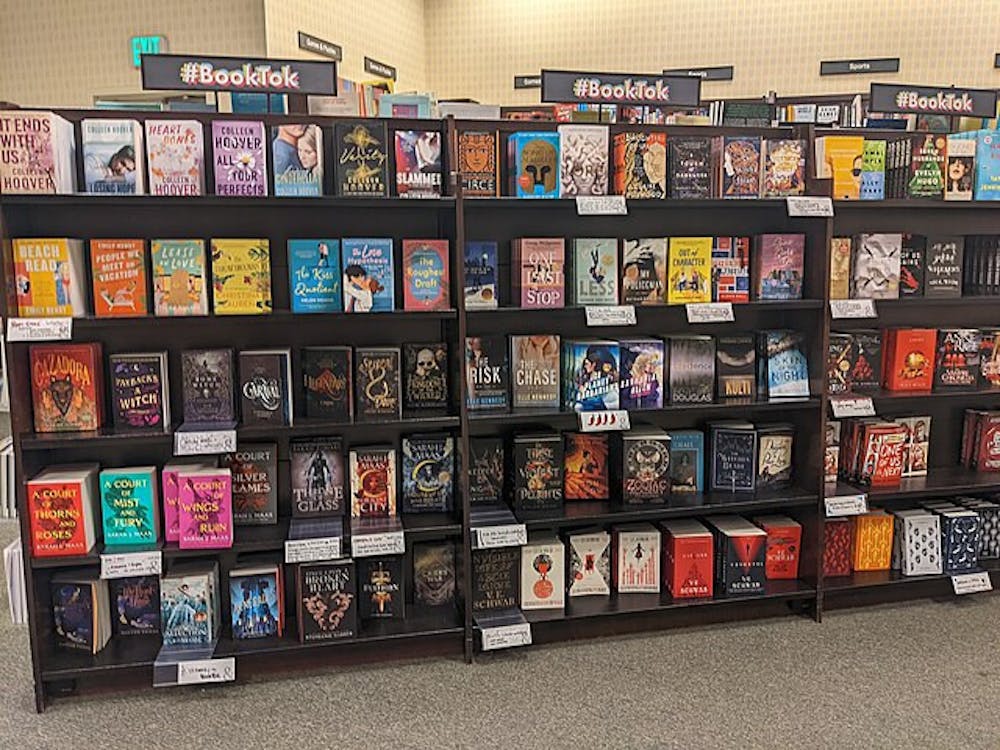If you have TikTok or any short-form social media, have walked into a bookstore recently or have simply spoken to someone who likes to read, you’ve probably heard of BookTok.
BookTok is a subgenre of the popular social media platform TikTok, populated by bookworms giving book recommendations and reviewing books. It’s like a big book club which, in theory, is great.
While on the surface BookTok may be promoting reading, it is in fact dumbing down readership, reducing media literacy and making the reading crisis worse. From authors pandering to audiences through trends to dumbing down materials into a few tropes, BookTok has made easy-to-digest and mass marketable works massively popular and has fundamentally changed the way booksellers and authors market their works for the worse.
Let me preface my argument by saying: People are allowed to like what they like. There is more nuance to the issue than I can fit into 800 words, including the fact that BookTok is dominated by women — I may come off as ridiculing yet another thing women enjoy. However, from a writer’s and reader’s perspective, BookTok has done more damage to the literature community than people may think.
As with many communities on TikTok, BookTok was founded in 2020 during the COVID-19 pandemic. With nothing to do, many people, after seeing a BookTok post, hopped onto the reading train and ordered whatever books the BookToker recommended. However, with fewer adults and children reading books and with attention spans decreasing significantly due to social media, people’s tolerance for reading has dropped.
So, in order to get on the trending page, BookTokers have, unknowingly or knowingly, begun to market books by using as little nuance as possible. They pull out whatever is trending at that moment (right now, it’s hockey romances?) and reduce it to just the trending tropes instead of focusing on any other themes or character development. To put it into perspective, it’s like if someone took The Great Gatsby and marketed it with the tropes “pining,“ “exes to lovers” and “love triangle,“ and ignored the themes of social class, cynicism toward the American Dream and glamorization of certain problematic/abusive themes. The way BookTokers recommend books has made it so that readers flock to books just for one trope and ignore the rest of the novel.
However, it’s not always the BookToker’s fault if tropes are all a novel has to offer. Authors are feeling pressured to follow trends and are pushing out low-quality novels with no actual literary value to sell books. As a writer myself, I can understand the desire to be on the New York Times Best Sellers list and to get a six-figure movie deal, especially since writing as a career most times doesn’t pay the bills. However, compromising your novel’s plot and characters in favor of pandering to a larger audience has its problems. This strategy has normalized the use of tropes and one-note plots that have further decreased audiences’ attention spans and media literacy.
These low-level, easy-to-read, oftentimes young adult romance/smut novels are not inherently bad for people. However, when the majority of the trending books on BookTok are able to be boiled down into three tropes, have black-and-white plots and characters with no nuance, and when their main pull is that they require little to no analytical thinking, it becomes a problem. It may lead potential readers to believe that’s all there is to reading and prevent them from venturing into literature that is deemed too difficult or boring.
A combination of unimaginative novels, unnuanced marketing tactics and a readership that is continually growing more intolerant to complex thought processes are all the results of BookTok. While the community is not all this way and while it has done many good things for promoting reading and pushing lesser-known authors to the top of the New York Times Best Sellers list, the impact it has actually had on literature has done immeasurable damage that we’ll only see in years’ time.
The hobby of reading, where thinking is the main activity, has suffered. Short-form content has removed the value of thinking, and, now that that’s the norm, novels need to adapt to do the same thing. Already-struggling industries such as publishing and bookselling need to dumb down their approaches to market to mass audiences who have a lessening tolerance for nuance and search for keywords instead of complexity. This way of marketing is not going away, and more and more books are going to follow consumeristic trends instead of contributing to the complexity and authenticity of literature, continuing this decline of art and humanities in favor of an ignorant population and profits.
Next time you walk into a Barnes and Noble, look out for a table with a poster saying “#BookTok” with books that have tropes such as “enemies to lovers” or “sunshine x grumpy” written on the back, and buy at your own risk.
Isabella Madruga is a senior majoring in Writing Seminars and Sociology from San Francisco, Calif.





